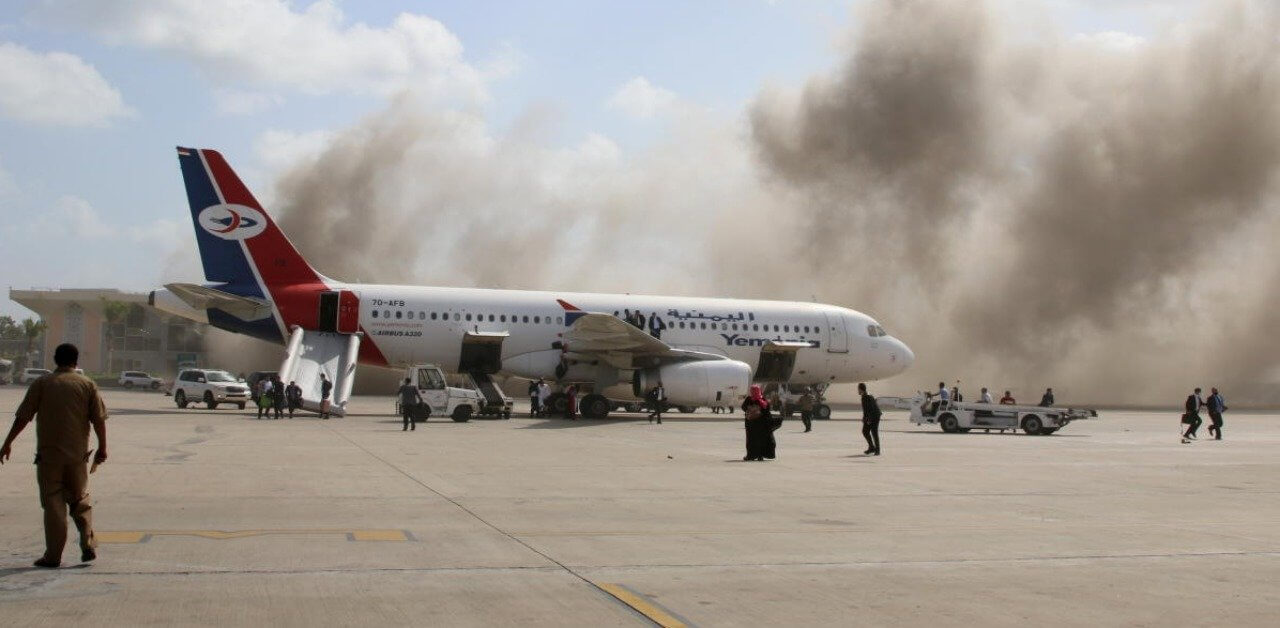On Thursday, Saudi-led coalition warplanes attacked the Houthi-held capital Sana’a in Yemen in retaliation to the attacks on the southern port city of Aden on Wednesday. This comes just days after Yemen’s new Riyadh-backed government was sworn into office, highlighting the enduring tensions in the region and Saudi Arabia’s continued support for the Yemeni government.
According to Houthi-run Al Masirah TV, the coalition launched overnight air attacks on Sana’a International Airport and two Houthi sites in Rima Hamid in Sanhan district and Wadi Rjam in Bani Hashish district, both of which are situated in southern Sana’a. Loud blasts were reportedly heard by locals and warplanes flew overhead for several hours.
“There are more than eight raids that have been carried out,” Al Jazeera’s Mohammed Al Attab, reporting from Sanaa, confirmed. The attacks were launched as an act of retaliation against the Iran-backed Houthis for staging an attack on Aden’s airport and the presidential palace earlier this week. Over the years, the coalition has killed thousands, including many civilians. No immediate casualties have been reported till now following the latest airstrikes.
On Wednesday, a deadly attack over Aden airport killed at least 26 people and injured dozens more. The attack happened just after President Mansour Hadi’s new power-sharing cabinet arrived in Yemen. This was followed by a second attack on the Maasheq palace, where Cabinet members were taken to safety after the airport attack.
On Saturday, President Hadi swore in a new government headed by Prime Minister Maeen Abdulmalik Saeed in the Saudi capital Riyadh. The 24-member cabinet was formed following a power-sharing deal brokered by Saudi Arabia last year. This continued proximity to Riyadh has drawn anger from Houthi rebels, who in turn have sought to target government members and other key infrastructure.
A coalition statement said that it had downed an explosive-laden Houthi drone that was targeting the palace. “The desperate, terrorist attack to target Maasheq palace confirms the responsibility of the terrorist, Iran-backed Houthi militia of the attack in Aden International Airport,” the statement said. There was no immediate reaction from the Houthis, who had earlier denied responsibility for the airport attack.
The crisis in Yemen broke out at the onset of the Arab Spring in 2011, when a popular uprising ousted the country’s long-time authoritarian president, Ali Abdullah Saleh. Saleh was soon replaced by his deputy Hadi; however, due to his administration’s mismanagement, Yemen remains highly unstable.
This instability paved the way for Shiite Houthi rebels to take control over Yemen’s northern region, including the capital Sana’a. As a result, Hadi was forced to retreat into exile abroad. The conflict escalated dramatically in March 2015, when Saudi Arabia and eight other (mostly Sunni) Arab states—backed by the United States (US), the United Kingdom (UK), and France— began an airstrike campaign against the Houthi rebels, with the declared aim of restoring Hadi’s government. However, after Sana’a fell under Houthi’s control, the Yemeni government declared the southern city of Aden as the country’s temporary capital.
Meanwhile, on Wednesday, the same day as the attack on Aden, Abdulqadir Al-Murtadha, the head of the National Committee for Prisoners Affairs from the Houthi-led National Salvation Government (NSG), in an interview with Al-Masirah TV, stated, “We have assured the other party that the Saudi pilots will not be released from prison except in exchange for the Palestinian prisoners in Saudi Arabia.” Last year, Riyadh imprisoned 68 Palestinians and Jordanians following a mass trial that raised alarm among human rights groups.
All of these recent developments point to the fact that a resolution to the conflict is unlikely in the immediate future, particularly as neither side appears to be interested in dialogue.
Saudi-Alliance Air Raids in Sana’a Target Houthis in Retaliation To Aden Blasts
The Saudi-led coalition attacked the Sana’a International Airport and several Houthi sites in retaliation to what they believe were Houthi-led attacks earlier this week.
January 2, 2021

SOURCE: REUTERS
